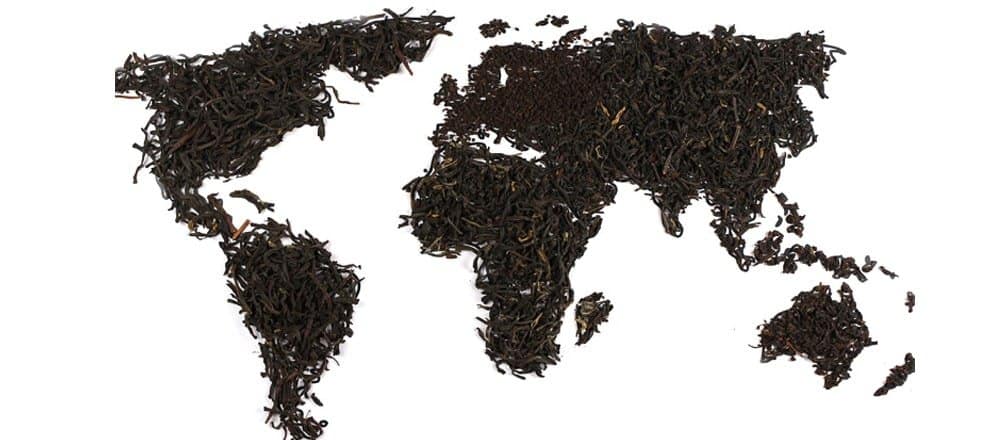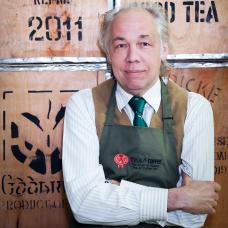Which Country Drinks the Most Tea : Top 10 in Order

It is all but impossible to escape British stereotypes of Dickensesque London streets, top hats and, of course, Tea drinking. Suffice to say, our capital today bears little resemblance to the time of Oliver Twist. What’s more, few people dress for the part unless done so ironically. The UK isn’t even the biggest Tea drinker. This then prompts the question: Which country drinks the most Tea?
The following article will talk you through the top 10 Tea drinking countries around the world. You will learn about the Tea culture of each nation and why its people love their brew so much. Once you know the facts, you can buy Loose Leaf Tea and Fresh Coffee at The Kent and Sussex Tea and Coffee Company. We pack all of our products fresh to order, ensuring the refreshing taste of quality.
Table of contents
- #1 Turkey Ranks Top for Tea Drinking Countries
- #2 Ireland is the Second the Biggest Tea Drinker
- #3 The United Kingdom Comes in at Number Three
- #4 Fourth is Iran for Tea Drinking Countries
- #5 Russia’s Love for Tea is Famous in Fifth Place
- #6 Next is Morocco at Sixth Place
- #7 New Zealand is the Seventh Biggest Tea Drinker
- #8 Number Eight is Chile in South America
- #9 Egypt Comes in at Ninth Place
- #10 Poland is Tenth for Tea Drinking Countries
- Conclusion – What Country Drinks the Most Tea

#1 Turkey Ranks Top for Tea Drinking Countries
Which country drinks the most Tea? That would be Turkey. In fact, such is its popularity there that the per capita consumption amounts to 3.16 kg or 6.96 lb annually. Black Tea (pronounced “çay”) is the most common type, although other varieties adored include Rosehip Tea (kuşburnu çayı) and Linden Flower Tea (ıhlamur çayı). The Turks’ love for it dates back several centuries.
The word “Tea” alone appears to be synonymous with friendship and hospitality. Indeed, rarely is there an event or occasion, from weddings to funerals, where it isn’t readily available. You will likely find it served in beautifully ornate tulip-shaped glasses. And, upon the first sip, you can expect it to be noticeably strong and full-bodied. The bottom line is that Turkey is the place to be if you enjoy Tea.

#2 Ireland is the Second the Biggest Tea Drinker
Stereotypes extend to Ireland, too, often – and unfairly – regarding excessive alcohol use. However, these beliefs are misplaced once again as the Irish drink far more Tea than hard liquor. Perhaps more remarkable is the fact that they have more of it daily than neighbouring Britain. The consumption rate there is 2.19 kg or 4.83 lb, the preference being – similar to Turkey – Loose Leaf Black Tea.
The culture surrounding it has roots in the 19th century, during which time the English imported it. The trouble was that it was of lower quality and so required extra milk. This also meant that brews had to be stronger, a custom that continues to hold true today. Ireland still prefers a bold, flavoursome Breakfast Tea with plenty of milk and enough space in the Teapot for a second cuppa.

#3 The United Kingdom Comes in at Number Three
The top Tea drinking countries move into somewhat more familiar territory with the United Kingdom at a third-place spot. Britons drink 1.94 kg or 4.28 lb of Tea per capita every year. Like Turkey and Ireland, they swoon over Black Tea – often known locally as Builders Tea. Also popular is Earl Grey, a Flavoured Tea, and, increasingly so, Herbal Tea varieties such as Peppermint and Camomile Tea.
The 350-year history of Tea in the UK is a particularly fascinating- if sometimes controversial – story. It gained momentum during the 18th century when high taxes on its import led to an increase in smuggling. Perhaps most famous is its association with the British Empire, not least the Boston Tea Party in the American Colonies – an event that sparked the American Revolution (1775-1783).

#4 Fourth is Iran for Tea Drinking Countries
When people ask the question, “Which country drinks the most Tea?”, few imagine Iran making it to fourth place. Yet, it is true. Persian culture has long played host to mass Tea drinking. The statistics from this Middle Eastern country suggest that, per capita, 1.50 kg or 3.30 lb is consumed annually. It first arrived through India during the 18th century, only to eventually become the national drink.
Chai-khanas (Tea houses) populate almost every street corner in Iran, where Tea is served strong. Most Iranians enjoy their cuppas with sugar to satisfy the sweet tooth. In fact, the traditional way is to place a sugar cube between the teeth while sipping! Colder regions will, understandably, have more hot brews throughout the day from breakfast to lunch to dinner and, indeed, every hour in-between.

#5 Russia’s Love for Tea is Famous in Fifth Place
Russia is home to a thriving, centuries-old Tea culture. More than 80% of the country’s population drinks it, which is 1.38 kg or 3.04 lb of Tea annually per capita. The biggest name is Russian Caravan Tea, a full-bodied Black Tea owing its origins to the Sino-Russian trade routes of the 1600s. When it comes to herbal infusions, Rosebay Willowherb Ivan Tea is a widespread choice.
An integral part of serving Tea in Russia is the use of a Tea Urn or Samavar (translated to mean “self-brewer”). This is a traditional device, typically made of metal, used to boil fresh water. Having one close by while entertaining guests is to be expected. It’s worth noting, too, that we stock a Russian Samovar Tea considered perfect for such gatherings with loved ones.

#6 Next is Morocco at Sixth Place
Our list concerning what country drinks the most Tea is now at sixth place. The holder is Morocco, with 1.22 kg or 2.68 lb per capita per year. Unquestionably the most sought after type is Moroccan Mint Tea. This is a Gunpowder Green Tea adorned with Peppermint Tea leaves. Serving it in Morocco is an art-form of sorts, one involving an almost ritualistic Tea-preparing ceremony.
The host will start by rinsing a Teapot with boiling water, then adding the Tea leaves, mint and perhaps some sugar. More water is added next so that the Tea can steep for a few minutes. The final step takes impeccable precision as the host proceeds to pour Moroccan Mint Tea into glasses from a height of at least 30 centimetres (12 inches). It is a remarkable sight to behold!

#7 New Zealand is the Seventh Biggest Tea Drinker
Some might recognise New Zealand’s appearance here as yet another surprise when looking at the biggest Tea drinking countries per capita. Every year, kiwis have 1.19 kg or 2.63 lbs’ worth of brews. This they often call “Gumboot Tea” – the equivalent of Britain’s Builder’s Tea. The term is fairly new, likely surfacing when exotic blends such as Earl Grey became popular in the country.
Black Tea as a whole, however, probably arrived in New Zealand with the British in the late-18th century, coinciding with increased trade with China. By the 1850s, it had become the beverage of choice among all classes of society. Little in that regard has changed today. New Zealanders continue to love their Loose Leaf Tea, be it with milk, sugar, manuka honey or lemon.

#8 Number Eight is Chile in South America
According to 2018 statistics, Chile ranks eighth for the top 10 Tea drinking countries. Consumption in the South American country comes to 1.19 kg or 2.62 lb per capita per year. So-called “real” Tea from the Camellia sinensis plant was probably introduced by the British during the 1800s. However, debatably more popular in not only Chile but in several neighbouring countries is Yerba Mate.
This plant (Ilex paraguariensis) belongs to the Holy (Aquifoliaceae) family, a rare example of a species to contain caffeine. Enjoying a cup of Yerba Mate (pronounced “Yer-bah-mah-tay”) is a communal experience among Chileans, signifying friendship, trust and togetherness. It is typically served in a hollowed-out Gourd and drunk through a straw called a Bombilla.

#9 Egypt Comes in at Ninth Place
Ninth place is reserved for Egypt, which has 1.01 kg or 2.23 lb per capita every year. Egyptians tend to have Black Tea with plenty of sugar (Koshary Tea) or even fresh mint (Saiidi Tea). Drinking Koshary is most common in Northern Egypt, while Saiidi is widespread in southern regions. Even more popular is Hibiscus Tea Bags (Karkadeh), a type of Herbal Tea today famous for its blood pressure-lowering abilities.
Archaeological evidence suggests that Hibiscus Tea Benefits began in ancient Egypt millennia ago. The Pharaohs reportedly consumed it to combat the fierce scorn of the desert heat while cruising along the river Nile. It was likewise used to treat heart and nerve diseases and even as a diuretic to increase urine production. Many of these medicinal qualities now have the backing of modern science.

#10 Poland is Tenth for Tea Drinking Countries
Last but certainly not least is Poland, with 1.00 kg or 2.20 lb annually per capita. During the notoriously cold Polish winters, there can be no better choice. It has been present in the country since the reign of King John II Casimir (1609-1672). This was thanks in part to his wife, Maria Ludwika Gonzaga, who introduced it to the royal court, prompting it to become an everyday drink soon after.
Nowadays, a Polish family gathering involves Black Tea with sugar and lemon before, during, after or in-between meals. Alternatively, should someone want something a little stronger, they could have a herbata z prądem, a blend of Tea and alcohol. Rum is the choice accompaniment, although any liqueur or vodka will do. We can’t provide the booze, but we do offer the Loose Tea here at our Kent-based factory.
Conclusion – What Country Drinks the Most Tea
The country that drinks the most Tea in the world is Turkey, followed by Ireland, the UK, Iran, Russia, Morocco, New Zealand, Chile, Egypt and Poland.
You can visit these places and find out their respective Tea cultures for yourself, or you can simply sit back, relax and enjoy a brew at home. Should it be the latter, be sure to count on The Kent and Sussex Tea and Coffee Company.

 Loose Leaf Tea
Loose Leaf Tea Pyramids
Pyramids Tea Bags
Tea Bags Africa
Africa Assam
Assam Ceylon
Ceylon Chinese
Chinese Darjeeling
Darjeeling European
European Indian
Indian Japan
Japan Nepal
Nepal South East Asia
South East Asia Ayurveda Tea
Ayurveda Tea Black Tea
Black Tea Chai Tea
Chai Tea Flowering Tea
Flowering Tea Fruit Tisanes
Fruit Tisanes Green Tea
Green Tea Herbal Tea
Herbal Tea Matcha Tea
Matcha Tea Oolong Tea
Oolong Tea Organic Tea
Organic Tea Pu erh Tea
Pu erh Tea Rooibos Tea
Rooibos Tea White Tea
White Tea Asian Coffee
Asian Coffee Caribbean Coffee
Caribbean Coffee Central American Coffee
Central American Coffee South American Coffee
South American Coffee Coffee Blends
Coffee Blends Decaffeinated Coffee
Decaffeinated Coffee Espresso Coffee
Espresso Coffee Ethically Sourced Coffee
Ethically Sourced Coffee Flavoured Coffee
Flavoured Coffee Organic Coffee
Organic Coffee Single Origin Coffee
Single Origin Coffee Chocolate 1
Chocolate 1 Chocolate 2
Chocolate 2 Chocolate 3
Chocolate 3 Chocolate 4
Chocolate 4 Chocolate 5
Chocolate 5 Chocolate 6
Chocolate 6 Chocolate 7
Chocolate 7 Chocolate 8
Chocolate 8 Chocolate 9
Chocolate 9 Loose Tea Filters
Loose Tea Filters Tea Accessories
Tea Accessories Tea Bricks
Tea Bricks Tea Caddies
Tea Caddies Tea Caddy Spoons
Tea Caddy Spoons Tea Gift Ideas
Tea Gift Ideas Tea Infusers
Tea Infusers Tea Strainers
Tea Strainers